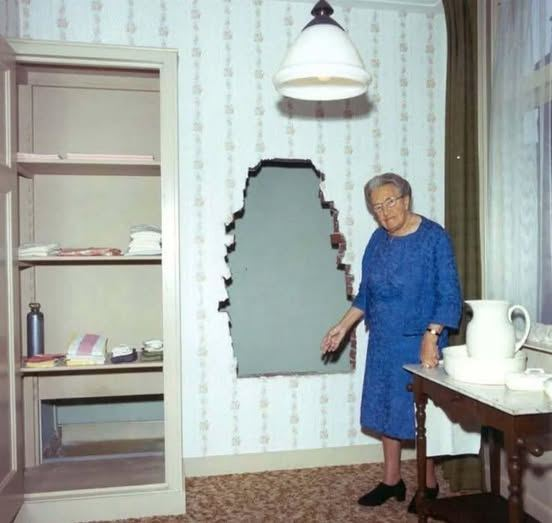During the horrors of World War II, when fear spread across Europe and Nazi occupation threatened millions, a humble Dutch family chose a path of unimaginable bravery. In the city of Haarlem, Holland, Corrie Ten Boom and her family made a decision that would forever change their lives — they built a secret hiding place inside their home to protect Jewish people and resistance members from persecution.
At first glance, the Ten Boom home appeared ordinary. Yet within its walls was a carefully constructed refuge, hidden behind a false wall in Corrie’s attic bedroom. To most, it was just another part of the house. But for those running from Nazi soldiers, it was a lifeline — a chance to survive when hope was nearly gone.
The hiding place itself was small and cramped, no larger than a closet. It could shelter six or seven people at a time, who would often remain in complete silence for hours or days. To ensure the safety of those inside, the Ten Booms installed a ventilation system and developed elaborate warning codes. When danger was near, a secret signal would alert everyone to hide immediately.
Corrie, along with her father Casper and sister Betsie, became deeply involved in the Dutch resistance. They smuggled food ration cards, coordinated safe passages, and used their watchmaking shop as a front for these dangerous operations. Every day they risked arrest, imprisonment, and execution — yet they persisted.

Eventually, their courage came at a cost. In 1944, the Ten Boom family was betrayed. The Gestapo raided their home, and although the hidden Jews in the attic remained undiscovered at that moment, Corrie and her family were arrested. Her elderly father soon died in custody, and Corrie and Betsie were sent to Ravensbrück concentration camp. In that brutal place, Betsie’s health failed, and she died. Corrie, however, survived — and she carried her sister’s words of forgiveness and hope for the rest of her life.
After the war, Corrie Ten Boom traveled the world sharing her testimony. She spoke not only of the horrors of persecution but also of the power of forgiveness and faith in the face of unimaginable cruelty. Her book, The Hiding Place, brought international attention to her story and inspired generations.
Today, the Ten Boom house stands as a museum in Haarlem, reminding visitors of the cost of courage and the strength of ordinary people who chose to protect others at the greatest personal risk. The hidden room still exists — a silent witness to the lives saved and the sacrifices made within its narrow walls.
The legacy of Corrie Ten Boom is more than history. It is a living call to compassion, reminding us that even in the darkest times, light can shine through the smallest acts of love and defiance.